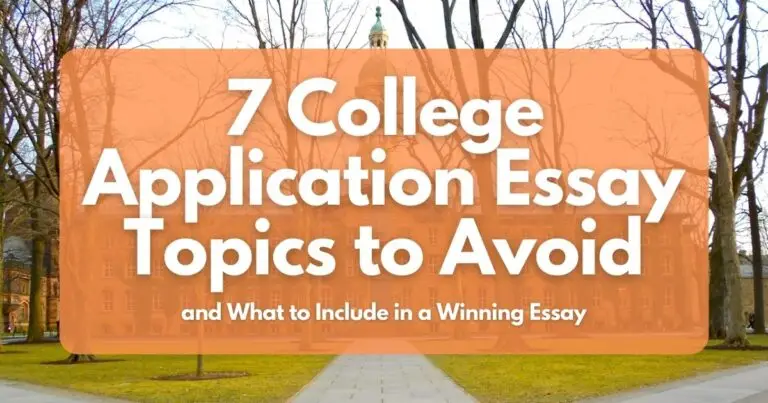Hey this is Pete from Achieve Tutorials, and today we’re going to talk about seven essay topics to avoid in your college application essays, and the kind of stories that you should include in your application essay.
But before we get to that, if you haven’t subscribed, please click that subscribe button.
Let me start by saying that college application essays can be a very valuable part of your entire application process. But probably only about 10 to 15 percent of college application essays actually help students to get into college; probably 30 to 50 percent help keep them out of college. You want to be in that top 10 to 15%. You want your story to be good enough, memorable enough that it’s going to make the admissions officer want to let you into their college.
So let’s talk about things to avoid and things to include in your college application essay. All right, topics to avoid while you’re writing your college essays.
First topic to avoid: that one week vacation to insert country here that changed your life. You have no idea how many people write about that trip to Nicaragua where they built houses for a week that changed their life. Schools don’t want to hear it. They don’t want to see it. They roll their eyes every time they see one of these essays, so avoid that essay.
Second, nobody wants to hear about your romance or your love life. Avoid those stories like the plague.
Third, don’t write anything about illegal activity or sketchy activity, anything that involves drugs, alcohol, speeding…anything that puts you or your behavior in a bad light should be avoided. Even if there’s a lesson at the end, you should avoid this type of essay.
Fourth don’t write an essay that projects a negative view of life. If there’s real negativity in your story, and especially if it ends with negativity, it’s not going to do you any favors getting into college.
Fifth, don’t write anything about information that’s already in your application. This is your opportunity to tell a new story, to say something different, so avoid rehashing the things that are already in there that they already can learn about from your activities or maybe another short essay or something like that.
Number six, and I hate to say this athletes: avoid the sports essay. Don’t write about sports. Show them that you have broadened your horizons a little bit beyond your sports activities.
And finally, avoid any essay that reveals intimate details that might make someone uncomfortable. Now it is part of your job to present yourself as an individual so that people can get to know you as an individual, but anything too intimate, anything cringe-worthy, avoid that.
So what should you include? Well stories that make you a more complete person, that flesh out your application, that make you someone that the admission staff wouldn’t want to reject because they get to know you a little bit as a person, an individual.
You can also write stories that show personal growth. It’s totally okay to talk about a mistake you made in the past if you’ve grown from it and the growth is a good valuable story.
It’s also valuable to write stories that show empathy, compassion, and insight. This shows people that you’re not just inward looking that you’re actually participating in the world around you and you’re aware of the world around you and people’s needs and feelings.
But you also can write an essay that’s about self-introspection, about thinking about yourself and who you are and who you want to become and how you have become the person you want to become. That’s a story that can play very well to college admissions officers.
Now I want you to notice that I started every one of these with the word “story.” These should be stories. They should tell a tale. This is not just a listing of things, this is not cold hard facts. This is a story where you’re trying to sell who you are as an individual and why that individual is interesting and would be a good college student.
Now these stories can be very small stories. One of the best essays I ever read was about having dinner with the family. But they can be really big stories and meaningful stories. I had a student who wrote about tracing his grandfather’s steps through his life…his grandfather had been interned in a Japanese internment camp during World War II…and learning more about his grandfather through retracing these steps after he had passed away than he had ever known before.
They can be small stories. They can be big stories. They just have to matter to you and be meaningful.
Thank you for watching, and for more information you can go to our website for more videos on our blog or subscribe to our YouTube or Instagram feeds. And don’t forget, Aim Higher!





